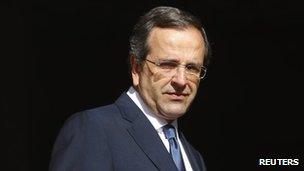Eurozone debt crisis: Awaiting the verdict on Greece
- Published
- comments

The Greek prime minister is asking for more time to make cuts
It was in October 2009 that Greece first told its European partners that it was in trouble, external. Its accounts were as good as fakes, it said, and its true deficit was more than 13%.
Now nearly three years later Greece still dominates the crisis talks of summer. Despite two bailouts, the Greek problem has not been fixed. It will top the agenda when the German chancellor and the French president meet in Berlin on Thursday evening.
Over the past five years the Greek economy has shrunk by 20%, an unprecedented decline for a Western economy.
Wages, pensions and civil service jobs have all been slashed and yet a further 11.5bn euros (£9bn; $14.3bn) of savings needs to be found. That is the condition for receiving a further tranche of money under the second bailout deal. Without the funding Greece will face bankruptcy in October.
There are two versions of what has happened in Greece. One is that austerity has tipped the country into a cycle of decline, into a great depression and that further savings are counter-productive. They will only shrink tax revenues further.
The other narrative is that Greece has not lived up to its promises to make deep structural reforms of its economy, to overhaul its tax system, to privatise ailing state agencies and to reduce the bloated public sector.
There is truth in both versions but in September there will be a verdict on the Greek performance. Much will depend on it.
'Horrors recede'
The debt inspectors from the EU, the IMF and the ECB (the so-called troika) will deliver their report on whether Greece is living up to its commitments.
Its conclusions may well determine whether Greece stays in the euro.
If it highlights a string of failings, there are plenty of German politicians who will conclude that Greece is a "bottomless pit". If, however, the report reveals that Greece is seriously committed to meeting its obligations, it may win the breathing space it has called for.
Even in summer there is a vigorous debate going on in Germany about Greece. There is a hardening of mood. A junior minister told me that he doubted the German parliament would support any extra funding for Greece.
MPs who support Angela Merkel's coalition have been declaring "enough is enough". One senior minister opined that a Greek exit from the euro no longer contained any "horrors".
The deputy chairman of the chancellor's Christian Democrats, Dr Michael Fuchs, said a Greek exit would not have a great impact anymore. Others, however, are hinting at the possibility of small concessions.
Chancellor Merkel herself is likely to wait until all the facts are in before deciding whether to give Greece more time. That is her style.
She does not want Greece to leave the euro. In the past she has said that there are too many unknowns that would flow from a Greek exit. She fears that a Greek departure would put Spain and Italy under pressure. She is a politician who likes to shy away from risk.
French solidarity
Certainly the high priests of the eurozone in Brussels are determined that Greece stay in the eurozone. They believe that any exit would be damaging to the whole European project.
The other key player is France. There is undoubtedly tension in the Franco-German relationship.
When Francois Hollande and Angela Merkel meet on Thursday, they will try and reach common ground on Greece. Unlike in Germany there is little public debate in France over whether Greece should receive more help.
The instinct of the French government is to back solidarity within the eurozone. If Athens needs more "breathing space", then Paris is more likely to agree than Berlin. In any event several ministers in the French government believe that the policy of "austerity first" has been self-defeating in Greece.
These differences will play out over the weeks ahead, but sooner or later a momentous decision will have to be made: to stick with Greece, even if that means showing some flexibility, or to conclude that Greece cannot meet commitments made.